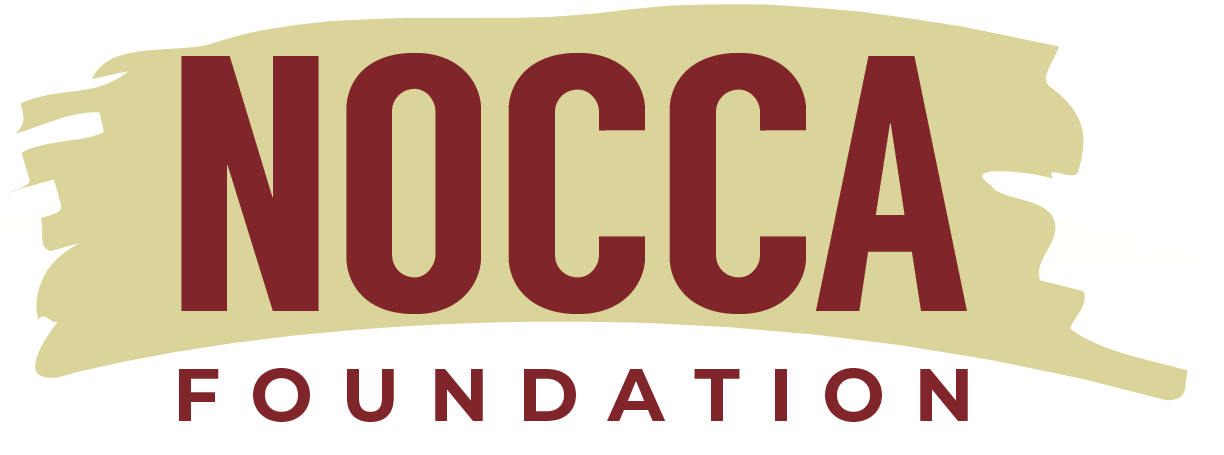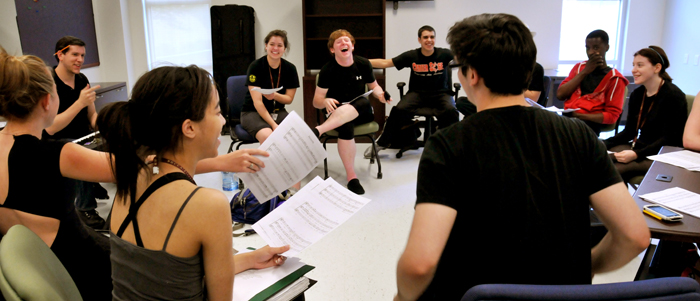The New Orleans Center for Creative Arts has provided professional arts training to high school students since 1973. Today, NOCCA offers curriculum in Creative Writing, Culinary Arts, Dance, Media Arts, Music, Theatre, and Visual Arts to students across the state. NOCCA is central to Louisiana’s rich cultural heritage, boasting a long list of distinguished alumni that includes jazz greats Wynton Marsalis and Harry Connick Jr.; actors Wendell Pierce and Anthony Mackie; and opera star Jeanne Michele Charbonnet.
Beginning in the fall of 2011, NOCCA will offer a full-day option for students — one that includes not only outstanding training in the arts, but also study in academic subjects like science and history. We’re very excited about this new chapter in NOCCA’s history, and we hope you are, too.
Below, you’ll find much more information about the new Academic Studio option, including admissions criteria, curriculum, and a discussion of what makes the Academic Studio different from other programs. If you like, you can also download this information in one handy PDF by clicking here.
* * * * *
Academic Studio Overview • Admissions • Curriculum • What Makes The Academic Studio Different?
The Academic Studio
Historically, students have attended NOCCA on a half-day basis, taking academic subjects at one school, then transferring to NOCCA for arts classes. Launching in the fall of 2011, the Academic Studio offers a new attendance option: a full-day, diploma-granting program.
The Academic Studio will take a comprehensive approach to learning, working across the full spectrum of the arts, science, and humanities. Classes will revolve around small-group learning led by certified educators whose passion for their given subject matches their students’ passion for art. A new kind of instruction will be provided by a team of scholars from around the world, who will travel to NOCCA each year to work with students directly, and will be available year round via interactive technology. The Academic Studio allows NOCCA to meet the needs of a broad range of learners by using the same master-apprentice teaching model that has defined NOCCA’s highly successful arts-learning environment.
Academic Studio classes will be held at NOCCA’s riverfront campus in the Marigny and Bywater neighborhoods. The program builds on NOCCA’s 37 years of success and creates an educational institution unlike any other. Students of the Academic Studio will leave NOCCA as creative thinkers, capable of identifying and solving problems on their own. They will become not only consumers of knowledge, but producers of knowledge, just as they are producers of art.
Admissions
Since NOCCA’s founding, faculty have evaluated potential students through a rigorous arts audition process. Admission has always been based on talent, paired with an eagerness to learn. The same will hold true for the Academic Studio.
To enroll in the Academic Studio, prospective students must successfully complete an arts audition. Because NOCCA expects more students to apply for the Academic Studio than there are spots available, qualified participants will be selected via lottery.
Students will still be able to attend NOCCA for half-day or afterschool arts instruction, continuing their enrollment at public, private, parochial or homeschools. The Academic Studio is simply another attendance option for students and families.
For its inaugural year, the Academic Studio will accept only rising 9th grade students (students currently in 8th grade). NOCCA will add subsequent grades each year through 2014.
Parents and students can find out more about NOCCA and the Academic Studio at Open Studio events. During the Open Studios, faculty and staff will be on-site to explain the specifics of the audition process and the commitment level required of all NOCCA students.
Here are some important dates for enrollment in the 2011-12 school year:
November 6:. Open Studio
January 8: Open Studio
January 15: Application Deadline
February/March: Auditions
Curriculum
The Academic Studio will be grounded in the same master-apprentice approach that sits at the heart of NOCCA’s arts training program. Instruction will begin with hands-on exploration and experimentation, and will be personalized to suit the full range of learners. Each student will have not only an arts mentor, but also an academic mentor, who will guide the student’s learning experience.
Just like NOCCA’s arts disciplines, the Academic Studio will benefit from visiting scholars, who will provide regular master classes, lectures and demonstrations for students. Many of these will come from NOCCA’s partner organizations like San Francisco’s Exploratorium, as well as an international advisory council that includes representatives from Apple, MIT, and other organizations at the forefront of emerging thought.
The Academic Studio will also see the beginning of a weekly Discovery Series, which will feature speakers with a wide range of expertise, and provide a space for students to share their work and common interests with their peers.
The Academic Studio will provide AP/IB-level classes and college co-enrollment classes. Graduates will receive a high school degree, and the program is designed to be fully TOPS-eligible.
What Makes NOCCA’s Academic Studio Different?
Our admissions are based upon talent in the arts.
Students must first audition for and be accepted into one of the arts disciplines at NOCCA: Creative Writing, Culinary Arts, Dance, Media Arts, Music, Theatre Arts, or Visual Arts. Once accepted, students who are interested in the full-day option are entered into a lottery for admission into the Academic Studio.
Our school day is longer than most.
Full-day students are at NOCCA from 8:30am until 6:30pm. The morning consists of two academic blocks. The afternoon consists of the arts block and a flexible block based on group projects and students’ individual needs and interests. Students rarely have traditional homework, although some project work may be completed at home. Most nights are reserved for practice in the arts.
Our school day is more focused than most.
Math and science are taught in two two-hour blocks in the fall semester; English and social studies are taught in the spring. Multiple foreign languages are offered year-round in the afternoon academic block.
Our curriculum is multi-leveled and multi-aged.
Entering students are thoroughly assessed to determine which concepts and skills they have already mastered. Based on this information, all coursework is individually designed to compact that which is already understood and expand upon that which is not. Within one course, students learn on a continuum, ranging from those working to get up to speed to those completing requirements at the AP level or with dual enrollment at a local university. Students’ ages and grade levels will not determine which courses they take.
Our curriculum is built around real-world problem-finding and collaborative project-based learning.
Instead of students being taught facts and practicing formulas before applying that learning to situations that matter to them, our coursework begins with projects that require students to seek out and master specific skills in order to solve the problems they encounter in their daily lives as artists. Assessment will include the ability to be productive within groups, and the ability to communicate processes, difficulties, solutions, and implications.
Our curriculum is in a constant development/improvement cycle, under the guidance of national and international scholars/practitioners in each field.
A group of physicists and other scientists at The Exploratorium in California meet regularly with our teachers and students to design meaningful project work that leads to deep understanding in physics, environmental science, biology and chemistry. These scholar/practitioners are on-site for four weeks each year, and also teach weekly lessons through interactive technology.
Practicing mathematicians from the University of Melbourne in Australia and the University of Texas – Austin lead an innovative math sequence that begins with immersion in number theory, statistics, and probability before moving to the more common geometry and algebra courses. We believe that previous anxieties or difficulties in math should not keep students from being exposed to the power and beauty of math in our world.
Our English program emphasizes effective writing and speaking skills, as well as lifelong pleasure reading. Skills are individually mapped for mastery, and each lesson is embedded in American and world literature.
Our social studies program is designed to forge links between world history/art history and world geography/world literature in order to develop global citizens. Of equal importance, U.S. history focuses on our own local history in New Orleans so that students can take their place in our region’s ongoing cultural story.
Our goal is to help students develop a growth mindset.
Individuals with a growth mindset believe that they are capable of developing their intelligence and talents over time. They are more concerned with finding opportunities to take risks and grapple with challenging ideas than with looking smart. They are not embarrassed to make mistakes, and welcome the critique element in both their arts training and their academic performance. Students, teachers, and parents value a record of progress over a record of completion.
To this end, Fridays are earmarked for our Discovery Series, a chance for students to learn from and discuss with experts such topics as: How the Brain Learns, Finding a Sense of Purpose, What it Means to be an Artist, and the Rights and Responsibilities of Civic Engagement. We believe that these ideas are critical in developing future leaders for the creative and cultural economy of our nation.
Our teachers are universal learners and mentors.
Although teachers specialize in a major discipline, they are each involved in all subjects. This ties our world-class arts program at NOCCA to the Academic Studio. English and history teachers become support teachers in math and science classrooms, and vice versa. Professional development and ongoing curriculum development occur during the support semester as well. Each teacher assumes direct responsibility for designing and monitoring appropriate curriculum choices and progress for 15 – 20 students.
Our delivery system is technology-based.
Each student has a laptop computer and access to state-of-the-art software in every course. Classrooms contain smart boards, document and digital projectors, and digital recording devices. Many classes are taught by members of our international Advisory Board through interactive technology. Most student projects are developed, evaluated, and stored electronically.
Our program is accessible.
NOCCA has always been and will remain tuition-free for all students who pass the audition. The NOCCA Institute provides Financial Aid to assist with ancillary costs so that resources are never a barrier to attendance.
Prior academic performance has a minimal impact on a student’s ability to succeed at NOCCA. Rather, the Academic Studio offers a fresh start for the full range of learners, with a personalized curriculum designed to ignite the curiosities of both gifted and previously struggling students.
We welcome input from students, parents, teachers and others who are interested in NOCCA’s continued development.


Pingback: Tweets that mention NOCCA’s Academic Studio -- Topsy.com